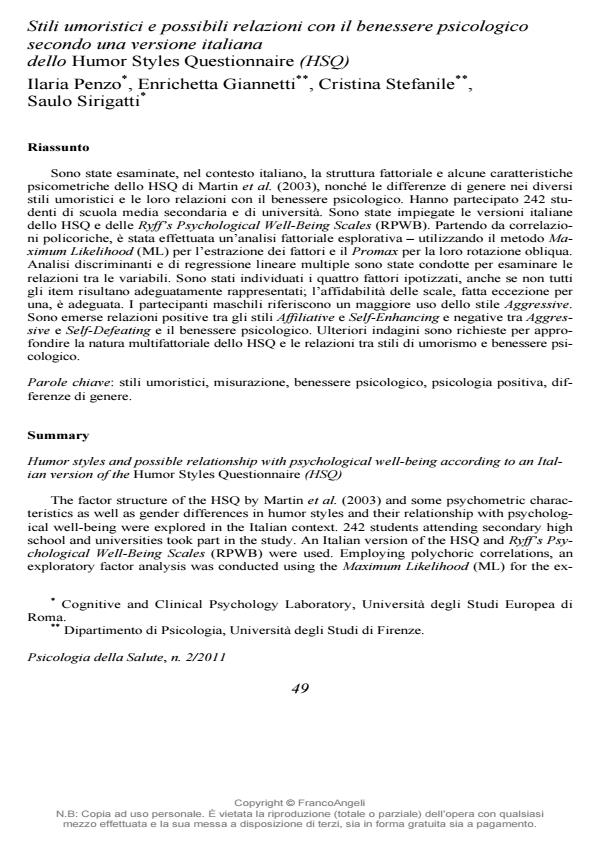Humor styles and possible relationship with psychological well-being according to an Italian version of the Humor Styles Questionnaire (HSQ)
Journal title PSICOLOGIA DELLA SALUTE
Author/s Ilaria Penzo, Enrichetta Giannetti, Cristina Stefanile, Saulo Sirigatti
Publishing Year 2011 Issue 2011/2
Language Italian Pages 18 P. 33-50 File size 126 KB
DOI 10.3280/PDS2011-002004
DOI is like a bar code for intellectual property: to have more infomation
click here
Below, you can see the article first page
If you want to buy this article in PDF format, you can do it, following the instructions to buy download credits

FrancoAngeli is member of Publishers International Linking Association, Inc (PILA), a not-for-profit association which run the CrossRef service enabling links to and from online scholarly content.
The factor structure of the HSQ by Martin et al. (2003) and some psychometric characteristics as well as gender differences in humor styles and their relationship with psychological well-being were explored in the Italian context. 242 students attending secondary high school and universities took part in the study. An Italian version of the HSQ and Ryff’s Psychological Well-Being Scales (RPWB) were used. Employing polychoric correlations, an exploratory factor analysis was conducted using the Maximum Likelihood (ML) for the extraction of factors, and the Promax for their oblique rotation. Multiple discriminant analyses and multiple linear regression were conducted in order to examine relationships among variables. The four hypothesized factors were identified, although not all items are adequately represented; scale reliabilities were appropriate, with one exception. Male participants reported more use of Aggressive style. Positive relationships were found between Affiliative and Self-Enhancing styles and negative between Aggressive and Self-Defeating. Further investigations are required in order to better understand the multifactorial nature of the HSQ and the relationships between humor styles and psychological well-being.
Keywords: Humor styles, measurement, psychological well-being, positive psychology, gender differences
- Humor Styles, Self-efficacy and Prosocial Tendencies in Middle Adolescents Rossella Falanga, Maria Elvira De Caroli, Elisabetta Sagone, in Procedia - Social and Behavioral Sciences /2014 pp.214
DOI: 10.1016/j.sbspro.2014.03.243 - Laughing over a Drink: Exploring the Relationship Between Humor Styles and Drinking Behavior Giulia Baldacci, Angelo Marino, Lia Cirillo, Lucia Guidi, Alessandra Musio, Alberto Dionigi, in Behavioral Sciences /2025 pp.1580
DOI: 10.3390/bs15111580 - Fear of being laughed at in Italian healthcare workers: Testing associations with humor styles and coping humor Laura Vagnoli, Kay Brauer, Francesca Addarii, Willibald Ruch, Valeria Marangi, in Current Psychology /2023 pp.18971
DOI: 10.1007/s12144-022-03043-9
Ilaria Penzo, Enrichetta Giannetti, Cristina Stefanile, Saulo Sirigatti, Stili umoristici e possibili relazioni con il benessere psicologico secondo una versione italiana dello <i>Humor Styles Questionnaire (HSQ)</i> in "PSICOLOGIA DELLA SALUTE" 2/2011, pp 33-50, DOI: 10.3280/PDS2011-002004